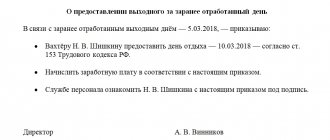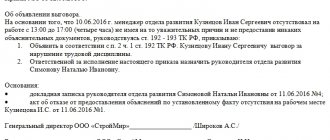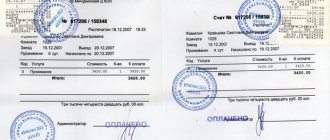Who monitors staff working hours?
Every fairly large organization has an employee who is responsible for recording staff working hours. Usually this:
- HR specialist;
- security service representative;
- head of one or another structural unit;
- secretary.
In a special journal, this person notes the time his colleagues arrived at work, as well as the time they left home.
All lateness, absenteeism, absences from the workplace for professional needs and personal matters, and overtime are also entered into the accounting document.
This practice allows the employer to know exactly how much time one or another of his subordinates spent at his workplace, whether he worked the required hours, how accurately he complies with labor discipline and the work and rest regime in force at the enterprise.
Situations in which it is impossible to do without drawing up a report of being late for work
Each company has its own operating hours. In some places the work schedule is quite free - the main thing is to work the required 8 hours a day or 40 hours a week, and in some places being late even one minute is a serious administrative offense (more often in large industrial enterprises with a continuous production cycle).
Usually, if an employee is late for work without serious reasons and good reasons, he strives to somehow come to an agreement with the employer. And in most cases this can be done. However, such a peaceful way of resolving the situation will not work if the employee is late for more than the first time, or if he behaves provocatively and inappropriately.
In such cases, the employer's representative will most likely draw up a report of lateness. And this will be a serious document, on the basis of which the violator may be subject to disciplinary action in the future (up to and including dismissal if he is regularly late).
If the reason for being late is valid, dismissal can be challenged
If an employee received a serious penalty or was dismissed, as it seems to him, unfairly, on the basis of Article 392 of the Labor Code of the Russian Federation, he is given the right to file a claim in court and challenge the decision of management. You can prepare for a trial regarding the unlawfulness of a recovery no more than three months after the undesirable verdict is rendered. If a person is fired, he must go to court no later than a month after the termination of the employment relationship at the initiative of the employer.
Cases of dismissal for being just 1 minute late do not give the right to make such a strict decision, and the court, of course, will side with the plaintiff. If an employee is 5 minutes late due to a transport delay, with a supporting document from the traffic police, the decision to dismiss will be rejected by the court.
Fine, warning, reprimand: what to choose for an employer
The court will also be on the employee’s side if the company has a system of penalties for being late. After all, as Art. 137 of the Labor Code of the Russian Federation, in such cases fines are provided only for additional payments. The employer must be very scrupulous when issuing certain forms of punishment. To avoid or minimize labor disputes due to violation of discipline, the employee must be more strict with his behavior and try not to violate labor discipline.
How to correctly record the fact of an offense and choose a measure of responsibility for the employee
It is useful for all employers to know that their actions must be within the legal framework. In other words, there are regulated permissions and prohibitions that must be adhered to when imposing a penalty. How many minutes can you be late, how to conduct an internal investigation into the reasons for regular absenteeism - all these nuances should be reflected in the company’s internal administrative documents.
| Allowed | Forbidden |
| Do not award the employee a bonus or award it in a smaller amount. With this method of dealing with tardiness, the employer, in addition to the correct procedure for implementing disciplinary action, will also be able to provide competent wording of local acts on bonuses, adopted in accordance with all regulations and requirements of the Labor Code of the Russian Federation. At the moment, it is not so difficult to predict the non-payment of bonuses to personnel who have disciplinary sanctions in the reporting period, or a reduction in the bonus by a percentage in the event of an outstanding penalty being accrued. | Creation of a system of penalties and deprivation of bonuses, reduction of monthly salary in the absence of such clauses in the employment contract of both parties. Judicial practice of the last twenty years shows a steady tendency that such “punishments” are assessed by the court as non-compliance with the terms of the contract on the part of the employer, and not the employee. |
| Dismiss due to regular lateness or due to being late for more than four hours in a row during a full working day (shift). | Use the specified grounds for dismissal in the absence of initial data for misconduct and/or in the absence of evidence. |
| Impose disciplinary sanctions within a regulated period. If the punishment is a reprimand or reprimand, then the period for bringing personnel to disciplinary liability is one month from the date of discovery and six months from the date of the commission of the offense. If the punishment is dismissal, then the period for recording several delays as systematic non-compliance with official duties is one year. If the presence of unresolved disciplinary sanctions is reflected in bonuses, the period depends on the current remuneration system and the frequency of accrual of payments and bonuses. It could be a month, a year, or a quarter. | Apply disciplinary sanctions to employees upon expiration of the period for bringing them to disciplinary liability. If an employee appeals it within three months from the date of issuance of the relevant order (one month when issuing an order of dismissal), it may be declared illegal by the court specifically on the specified grounds without examining other circumstances of the case. |
Who forms the act of lateness?
The report of lateness is usually written by the same employee who keeps track of the employees’ working hours.
When drawing up the act, it is imperative that at least one, or preferably two, witnesses be present, who will certify with their autographs that all the information included in the act is true.
The employee who is late must also sign the document. If for some reason he does not want to do this, this must be noted in the act.
Features of the act, general information
If you are faced with the need to draw up an act of being late for work, but you do not know exactly how to do this, read our tips and pay attention to the example document.
First, let's give general information that applies to any papers of this kind:
- Today there is no unified model of the act. This means that you can write it in free form or, if the organization has a document template, according to its type.
- Any act must have a certain structure, which includes a “header” - the beginning of the document, the main part and the conclusion.
- The act must necessarily include the signatures of the drafters, but it is not necessary to put a stamp on it. This is due to the fact that recently the mandatory requirement to use stamps for document approval has been abolished, so the act must be stamped only when such a rule is in the organization’s regulatory documents.
In addition, keep in mind that the act can be drawn up on a regular blank sheet of any convenient format (preferably A4) or on company letterhead. It is allowed to print the act on a computer (with subsequent printing) or write it by hand (without blots, errors or corrections) - all this does not matter in determining the legality of the document.
The act is made in two copies , which must be identical in content and equal in law.
One copy of the document remains with the employer, the second is given to the employee who is late for work.
What the Labor Code says: being 15 minutes late for work is a violation or not.
If the time period exceeds four hours, then this can be classified as absenteeism . For this reason, an employee can be dismissed under an article of the Labor Code of the Russian Federation. A corresponding note will be made in the work book, which may become a serious problem in the future and interfere with employment. Because of this, most enterprises give employees the opportunity to write a letter of resignation of their own free will. When an employee signs an employment agreement, he voluntarily agrees to perform a number of duties and participate in the production process, following the employers' routine.
The latter provide the regime of work, as well as rest, at the enterprises that are entrusted to them. In this case, the regime is considered part of the rules that must be observed, which is called labor discipline. If because of this a subordinate is deprived of a bonus, such a sanction is considered illegal. Despite the fact that deprivation of bonuses can be considered a penalty similar to disciplinary, the Labor Code does not provide for this. To deprive a bonus or reduce its size, it is required that the enterprise have a special provision for the calculation of bonuses.
It must establish the condition of mandatory compliance with labor discipline for bonuses. If a subordinate fails to provide documentation that demonstrates good cause, management may impose certain sanctions. First, they make a reprimand, then they issue a reprimand, and if the offense is committed again, this is followed by dismissal under Article 192 of the Labor Code.
However, you can also be fired due to a single delay of more than four hours.
repeated violation of labor discipline, recorded accordingly;
Labor law does not imply the assignment of any financial liability to the violating employee, with the exception of cases of deprivation of bonus payments. If for some reason an employer has introduced a system of fines, then he may be held administratively liable for non-compliance with labor legislation, since wages are an integral part of labor activity. Registration of being late for work according to the Labor Code
Read on the Russia-Ukraine website:
- When can you drive after drinking non-alcoholic beer?
- Letter of Guarantee for Refund of Money to Buyer Sample
- Removal from work grounds and procedure for removal
- Municipal Contract for the Provision of Property Storage Services
- Punishment of a Pedestrian for Crossing a Red Light
Attention!
Due to recent changes in legislation, the legal information in this article may be out of date! Our lawyer can advise you free of charge - write your question in the form below.
Sample document
At the beginning of the document it is written:
- his name;
- date of drawing up the act;
- place (settlement) where the employing organization is registered.
Then comes the main part. This includes:
- the official drawing up the act (his position, full name);
- in the same way - all other persons present during the formation of the document;
- personal data of the labor discipline violator;
- the time at which the offender arrived at the workplace. Here you must indicate exactly how late (in hours and minutes) the employee was late.
If the latecomer is ready to provide written explanations for his delay, this must be noted, as well as the opposite situation, when he does not have such explanations.
If necessary, the document can be supplemented with any other information, depending on the specific circumstances.
Finally, the act must be signed by all persons present.
conclusions
The Labor Code does not consider being late to the workplace an independent legal category. As a result, disputes between the subordinate and the employer due to dismissal for this violation of labor discipline end in court.
Since we are talking about a violation of labor regulations, to prove guilt it is necessary for the employee to familiarize himself in writing with the regulations. If, before the fact of being late, the offender did not familiarize himself (on receipt) with the norms of the local labor regulations, his failure to appear at the workplace at the established hour is not considered late.
If, after the issuance of a disciplinary sanction in the future, evidence of a valid reason for being late is presented or the specialist somehow achieves rehabilitation of his position, then, at the discretion of the head of the enterprise, the report on identified violations of the labor regime may be withdrawn from the employee’s personal file.
After drawing up the act
After the form has been finalized and the offending employee has reviewed it, the document must be submitted to the director for resolution. Based on it, he makes his decision either on a reprimand to a subordinate (usually for the first time) or on a more serious punishment.
Then the document goes to the HR department, where it is attached to the employee’s personal file and stored throughout the entire period of validity of the employment contract. After the dismissal of the person in respect of whom it was drawn up, the act, among other personnel documentation related to the quitter, is transferred to the archives of the enterprise.










